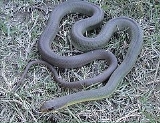
List of Minnesota reptiles
Encyclopedia
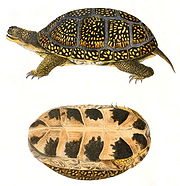
Reptile
Reptiles are members of a class of air-breathing, ectothermic vertebrates which are characterized by laying shelled eggs , and having skin covered in scales and/or scutes. They are tetrapods, either having four limbs or being descended from four-limbed ancestors...
s have been recorded in the US state of Minnesota
Minnesota
Minnesota is a U.S. state located in the Midwestern United States. The twelfth largest state of the U.S., it is the twenty-first most populous, with 5.3 million residents. Minnesota was carved out of the eastern half of the Minnesota Territory and admitted to the Union as the thirty-second state...
, including 17 species of snake
Snake
Snakes are elongate, legless, carnivorous reptiles of the suborder Serpentes that can be distinguished from legless lizards by their lack of eyelids and external ears. Like all squamates, snakes are ectothermic, amniote vertebrates covered in overlapping scales...
s, nine species of turtle
Turtle
Turtles are reptiles of the order Testudines , characterised by a special bony or cartilaginous shell developed from their ribs that acts as a shield...
, and three species of lizard
Lizard
Lizards are a widespread group of squamate reptiles, with nearly 3800 species, ranging across all continents except Antarctica as well as most oceanic island chains...
. Of those 29 species, two (Blanding's Turtle
Blanding's Turtle
Blanding's turtle is a semi-aquatic turtle of the family Emydidae. It is considered to be an endangered species throughout much of its range.-Taxonomy:...
and the Wood Turtle
Wood Turtle
The wood turtle is a turtle endemic to North America. It is in the genus Glyptemys, a designation given to only one other turtle: the bog turtle. The wood turtle reaches a carapace length of , its defining characteristic being the pyramidal pattern on its upper shell...
) have been listed as Endangered
Endangered species
An endangered species is a population of organisms which is at risk of becoming extinct because it is either few in numbers, or threatened by changing environmental or predation parameters...
by the International Union for Conservation of Nature, with another 19 listed as Least Concern
Least Concern
Least Concern is an IUCN category assigned to extant taxon or lower taxa which have been evaluated but do not qualify for any other category. As such they do not qualify as threatened, Near Threatened, or Conservation Dependent...
and nine have not been evaluated
Not Evaluated
Not Evaluated is a category applied by the IUCN, other agencies, and individuals to a species when they haven't been studied by the IUCN Red List of Threatened Species...
.
Minnesota does not have an official state reptile. However, the Blanding's Turtle was proposed as the reptile of the state in 1998 and 1999.
Snakes
| Common name | Scientific name | Conservation status | Description | Photograph |
|---|---|---|---|---|
| Eastern Yellowbelly Racer Coluber constrictor flaviventris The eastern yellowbelly racer is a subspecies of racer, a nonvenomous, colubrid snake.- Description :... |
Coluber constrictor flaviventris | Not Evaluated Not Evaluated Not Evaluated is a category applied by the IUCN, other agencies, and individuals to a species when they haven't been studied by the IUCN Red List of Threatened Species... |
Nonvenomous; adults reach 30–50 in (76.2–127 cm); color varies from olive to blue to nearly black | |
| Ringneck Snake Diadophis punctatus The ringneck snake or ring-necked snake is a colubrid snake species. It is found throughout much of the United States, central Mexico, and south eastern Canada. Ring-necked snakes are secretive, nocturnal snakes that are rarely seen during the day time... |
Diadophis punctatus | Least Concern Least Concern Least Concern is an IUCN category assigned to extant taxon or lower taxa which have been evaluated but do not qualify for any other category. As such they do not qualify as threatened, Near Threatened, or Conservation Dependent... |
Nonvenomous; adults reach 8–15 in (20.3–38.1 cm); has a distinct yellow ring around the neck; color varies from slate gray Slate gray Slate is a gray color with a slight azure tinge that is a representation of the average color of the material slate.The first recorded use of slate gray as a color name in English was in 1705... to olive |
|
| Black Rat Snake | Elaphe obsoleta obsoleta | Not Evaluated | Nonvenomous; adults reach 42 –; adults appear shiny black; underbellies are white with black mottles | 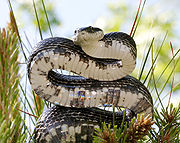 |
| Western Fox Snake Pantherophis vulpina The Western Fox Snake is a species of non-venomous colubrid snake.-Description:Western Fox Snakes are three to six feet long snakes with a black and yellow checkerboard pattern on their belly. They are usually light golden brown with dark brown spots and a short, flattened snout. Like most North... |
Pantherophis vulpinus | Least Concern | Nonvenomous; adults reach 36 –; color varies from tan to greenish-brown with large black blotches | 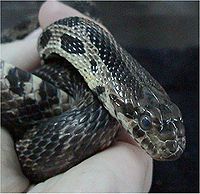 |
| Western Hognose Snake Heterodon nasicus Heterodon nasicus is a harmless colubrid species found in North America and northern Mexico. Three subspecies are currently recognized, including the typical form described here.-Description:... |
Heterodon nasicus | Least Concern | Nonvenomous; adults reach 16 –; color varies from light yellow or olive color with systematic brown blotches |  |
| Eastern Hognose Snake | Heterodon platyrhinos | Least Concern | Nonvenomous; adults reach 20 –; color varies from gray to brown with dark brown markings |  |
| Eastern Milk Snake Milk Snake The milk snake or milksnake is a species of king snake. There are 25 subspecies among the milk snakes, including the commonly named scarlet kingsnake... |
Lamptopeltis triangulum triangulum | Not Evaluated | Nonvenomous; adults reach 24 –; repeating red, black-outlined blotches | 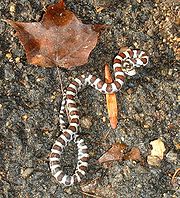 |
| Smooth Green Snake Smooth Green Snake The smooth green snake is a non-venomous North American colubrid. It is also referred to as the grass snake.-Description:... |
Opheodrys vernalis (sometimes Liochlorophis vernalis) |
Not Evaluated | Nonvenomous; adults reach 14 –; color varies from a uniform bright green to brownish green | 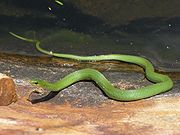 |
| Northern Water Snake Northern Water Snake The Northern water snake is a large, nonvenomous, well-known snake in the Colubridae family that is native to North America.-Behavior:... |
Nerodia sipedon | Least Concern | Nonvenomous; adults reach 24 –; color varies from gray to reddish brown with dark brown crossbands |  |
| Bullsnake Bullsnake The bullsnake ' is a large non-venomous colubrid snake, widespread in the central part of the United States, northern Mexico, and southwestern Saskatchewan and Alberta Canada. It is currently considered a subspecies of the gopher snake '... |
Pituophis catenifer sayi | Not Evaluated | Nonvenomous; adults reach 37 –; color varies from tan to brown with large brown or black spots |  |
| Brown Snake Storeria dekayi Storeria dekayi, commonly known as the brown snake or De Kay's snake, is a small species of colubrid snake.-Geographic range:... |
Storeria dekayi | Least Concern | Nonvenomous; adults reach 6 –; color varies from brown to reddish-brown; two rows of dark spots across the back | 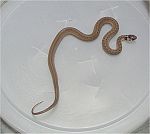 |
| Northern Redbelly Snake Storeria occipitomaculata The redbelly snake is a species of snake found in North America. The following subspecies are known:*Florida redbelly snake - Storeria occipitomaculata obscura Trapido, 1944... |
Storeria occipitomaculata | Least Concern | Nonvenomous; adults reach 8 –; color varies from gray-brown to reddish-brown | |
| Plains Garter Snake Plains Garter Snake The Plains Garter Snake is a species of Garter snake native to most of the Central United States stretching as far north as Canada and as far south as Texas. It has a distinctive orange or yellow stripe that goes from its head to tail, the rest of its body is mainly a gray-green color... |
Thamnophis radix | Least Concern | Nonvenomous; adults reach 15 –; similar to other garter snake Garter snake The Garter snake is a Colubrid snake genus common across North America, ranging from Alaska and Canada to Central America. It is the single most widely distributed genus of reptile in North America. The garter snake is also the Massachusettsstate reptile.There is no real consensus on the... s but with a yellow stripe down the side |
 |
| Eastern Garter Snake | Thamnophis sirtalis | Least Concern | Nonvenomous; adults reach 18 –; color varies from black to olive; usually has three yellowish stripes, one down the back and one along each side | |
| Lined Snake | Tropidoclonion lineatum | Least Concern | Nonvenomous; adults reach 8 –; colors range from gray to black with a lighter color stripe down the middle of the back | 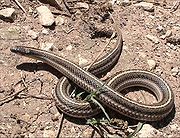 |
| Timber Rattlesnake Crotalus horridus Crotalus horridus, the timber rattlesnake, is a species of venomous pitviper found in the eastern United States. This is the only rattlesnake species in most of the populous northeastern United States. No subspecies are currently recognized.... |
Crotalus horridus | Least Concern | Venomous; adults reach 36 –; color varies from yellow to tan with dark markings on the back | |
| Eastern Massasauga Sistrurus catenatus Sistrurus catenatus is a venomous pitviper species found primarily in the United States. Three subspecies are currently recognized, including the nominate subspecies described here.-Description:... |
Sistrurus catenatus | Least Concern | Venomous; adults reach 18 –; color varies from gray to gray brown with dark brown blotches down the middle of the back and along both sides | 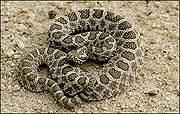 |
Turtles
| Common name | Scientific name | Conservation status | Description | Photograph |
|---|---|---|---|---|
| Spiny softshell turtle Spiny Softshell Turtle The Spiny softshell turtle is a species of softshell turtle, one of the largest freshwater turtle species in North America... |
Apalone spinifera spinifera | Not Evaluated | Female length of 7–19 in (17.8–48.3 cm); male length of 5–9.25 in (12.7–23.5 cm); olive to brown, flexible, smooth shell | 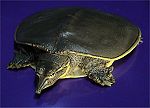 |
| Common snapping turtle | Chelydra serpentina | Least Concern | Length of 8–14 in (20.3–35.6 cm); weight of 10–35 lb (4.5–15.9 kg); shell color varies from tan to black | |
| Painted turtle Painted Turtle The painted turtle is the most widespread native turtle of North America. It lives in slow-moving fresh waters, from southern Canada to Louisiana and northern Mexico, and from the Atlantic to the Pacific. The turtle is the only species of the genus Chrysemys, which is part of the pond turtle... |
Chrysemys picta bellii | Least Concern | Length of 4–10 in (10.2–25.4 cm); carapace color varies from tan to olive, with markings on the neck | 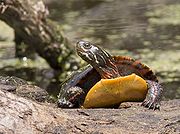 |
| Wood turtle Wood Turtle The wood turtle is a turtle endemic to North America. It is in the genus Glyptemys, a designation given to only one other turtle: the bog turtle. The wood turtle reaches a carapace length of , its defining characteristic being the pyramidal pattern on its upper shell... |
Glyptemys insculpta (formerly Clemmys insculpta) |
Endangered Endangered species An endangered species is a population of organisms which is at risk of becoming extinct because it is either few in numbers, or threatened by changing environmental or predation parameters... |
Length of 5.5–8 in (14–20.3 cm); rough, tan to gray carapace | 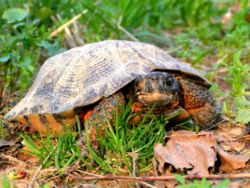 |
| Blanding's turtle Blanding's Turtle Blanding's turtle is a semi-aquatic turtle of the family Emydidae. It is considered to be an endangered species throughout much of its range.-Taxonomy:... |
Emydoidea blandingii | Endangered | Length of 6–9 in (15.2–22.9 cm); yellow, long, narrow throat; domed carapace | 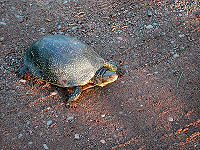 |
| False map turtle False Map Turtle The false map turtle or Mississippi map turtle is a species of turtle found in the United States. It is a common pet species.- Identification :... |
Graptemys pseudogeographica | Least Concern | Length of 3–10 in (7.6–25.4 cm); upper shell has yellow connected circles or lines; lower shell is greenish-yellow | |
| Ouachita map turtle Ouachita Map Turtle The Ouachita Map Turtle or Sabine Map Turtle is a species of turtle found in the United States. This species’ carapace features a row of low spines, and is serrated on the rim. The carapace is olive, dark brown, or black in coloration with light yellowish markings with dark borders... |
Graptemys ouachitensis | Least Concern | Length of 6–10 in (15.2–25.4 cm); ridge down the center of the shell; bright yellow lines on the head and limbs | |
| Northern map turtle Northern Map Turtle The northern map turtle , or formerly common map turtle, is an aquatic turtle that belongs to the family Emydidae.-Description:... |
Graptemys geographica | Least Concern | Length of 6–10.75 in (15.2–27.3 cm); fine yellow lines on a brown to olive shell | 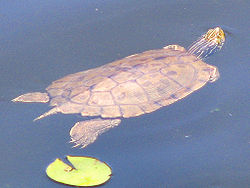 |
Lizards
| Common name | Scientific name | Status | Description | Photograph |
|---|---|---|---|---|
| Six-lined Racerunner | Cnemidophorus sexlineatus | Least Concern | Total length of 6 –; maximum body length of 3.4 inches (8.6 cm); light yellow to white stripes alternating with black stripes down back | |
| Five-lined skink | Eumeces fasciatus | Least Concern | Total length of 5 –; maximum body length of 3.4 inches (8.6 cm); brown to black body with short legs | |
| Prairie Skink Prairie Skink The Prairie Skink is a skink living in the prairies east of the Rocky Mountains in North America. It is one of only five species of lizards that occur in Canada.-Taxonomy:... |
Eumeces septentrionalis | Least Concern | Maximum body length of 8.8 inches (22.4 cm); juveniles are blue, adults are tan with black stripes |

